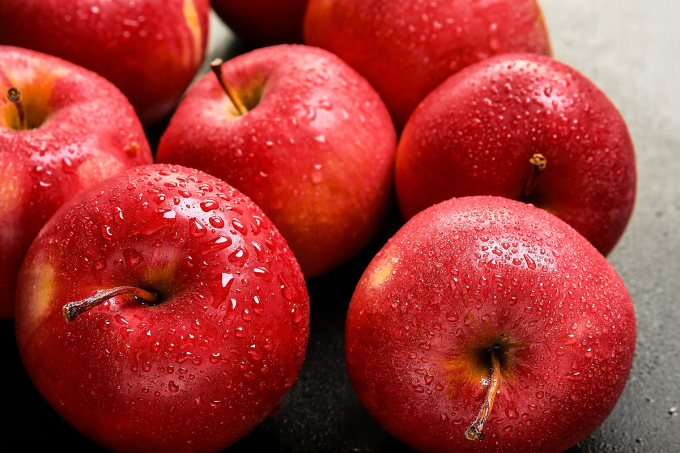Apples are a functional food that helps prevent damage to the body's cells, supports vitamin conversion, and reduces certain cancers and chronic diseases.
For a long time, many people have passed on the proverb "An apple a day keeps the doctor away". This makes apples one of the most popular fruits in the world .
A team of researchers in the US set out to find the scientific evidence behind this claim. Scientists analyzed the frequency of apple consumption and the number of doctor visits of more than 8,000 adults. Of these, about 9% ate an apple a day. After eliminating factors related to lifestyle, demographics and health history, they found that daily apple eaters used fewer prescription drugs than non-apple eaters. But the number of doctor visits was the same in both groups.
Meanwhile, another research group in Europe found that eating two apples a day improves cardiovascular health in 40 adults. Brazilian experts pointed out that eating three apples a day helps lose weight and reduce blood sugar levels in 40 women.
Apples are not as rich in vitamin A, which is not as beneficial for eyesight as carrots. They do not provide as much vitamin C as oranges. However, apples contain various bioactive compounds. These are natural chemicals that are commonly found in foods in small amounts and have beneficial effects on the body. These chemicals are not classified as nutrients like vitamins. Because they contain bioactive compounds, apples are classified as "functional" foods.

Apples are a functional food containing a lot of fiber that is beneficial for health. Photo: Freepik
According to Janet Colson, professor of Nutrition and Food Sciences at Middle Tennessee State University, functional foods are different from superfoods, which are the buzzwords used by brands to promote foods like kale, spinach, and blueberries. Labeling them as superfoods helps attract the public and increase sales.
Dietary supplements contain beneficial active ingredients, especially carotenoids. This is a group of 850 different pigments that give yellow, orange, and red colors to fruits and vegetables, including apples. They help prevent cell damage in the body, aid in vitamin conversion, prevent certain cancers, and improve heart health.
Apples natural fiber is one of the most bioactive components. Apple flesh contains pectin fiber, which reduces the amount of sugar and fat absorbed into the body, reducing the risk of diabetes and heart disease.
Apple peels contain natural chemicals called polyphenols, which play a key role in promoting health and reducing chronic disease. Anthocyanins are a subclass of polyphenols that give apple peels their red color. Diets rich in anthocyanins have been linked to improved heart health and treatment of Alzheimer's disease.
Another major polyphenol in apples is phloridzin. Scientists have studied phloridzin’s role in blood sugar control for over 100 years. Recent analysis confirms that it plays an important role in balancing blood sugar, reducing sugar absorption from the small intestine and increasing its excretion from the kidneys.
Thuc Linh (According to Conversation )
Source link






































![[Photo] Panorama of the cable-stayed bridge, the final bottleneck of the Ben Luc-Long Thanh expressway](https://vphoto.vietnam.vn/thumb/1200x675/vietnam/resource/IMAGE/2025/9/30/391fdf21025541d6b2f092e49a17243f)
![[Photo] The 1st Congress of Phu Tho Provincial Party Committee, term 2025-2030](https://vphoto.vietnam.vn/thumb/1200x675/vietnam/resource/IMAGE/2025/9/30/1507da06216649bba8a1ce6251816820)
![[Photo] President Luong Cuong receives President of the Cuban National Assembly Esteban Lazo Hernandez](https://vphoto.vietnam.vn/thumb/1200x675/vietnam/resource/IMAGE/2025/9/30/4d38932911c24f6ea1936252bd5427fa)
![[Photo] Solemn opening of the 12th Military Party Congress for the 2025-2030 term](https://vphoto.vietnam.vn/thumb/1200x675/vietnam/resource/IMAGE/2025/9/30/2cd383b3130d41a1a4b5ace0d5eb989d)
































































Comment (0)